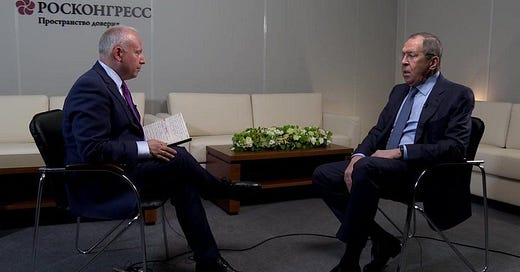In June 2022, the BBC’s Russia Editor Steve Rosenberg interviewed Sergei Lavrov about Russia’s Special Military Operation. This interview was broadcast on BBC World News 7 times between the 18th and 20th of June. It was put up on BBC News’s official YouTube channel, but that video was blocked for users in the UK, on the grounds that they can watch it on the BBC’s own iPlayer service (the producer of the interview also posted it).
It’s a good interview inasmuch as Steve Rosenberg conducts the whole thing in Russian and Lavrov is given a chance to explain Russia’s position, even though Rosenberg is confrontational and pretty disrespectful at times, notably replying “I am conducting the interview, not you” to one of Lavrov’s questions. Amongst other things, Lavrov says that “the Kyiv regime is shelling its own citizens. And you are selling them weapons so they can continue doing it”. No doubt Lavrov went into the interview expecting it to be hostile, but he nonetheless conducts it in a fairly friendly manner, more so (in my humble opinion) than Rosenberg does.
Judging by the comments under the video, it was a kind of Rorschach test - people who went into it hating Russia denounce Lavrov as a liar, and those who sympathise with the Russian position say the same kind of things as I am here. There are a few comments from people saying that, although they still think the Russian invasion of Ukraine was wrong and illegal, they weren’t aware of what had been happening to Russian speakers in Ukraine prior to the interview. I have to wonder whether their opinions might change even more if they were to realise just how much of what the BBC has been telling them about the conflict is not true.
Although it’s laudable that the BBC conducted the interview, it’s probably fair to assume that most British people didn’t watch it. It’s likely that more would have read the BBC’s June 17 news story reporting on the interview which, oddly, doesn’t provide a link to the interview itself, but presents many of the things he said as if they were untrue, and focuses on his remark that “Russia is not squeaky clean”. The article opens with a reminder that since the Russian army attacked Ukraine, thousands of civilians have been killed and whole towns reduced to rubble - note that they use the ‘passive voice’ trick of not explicitly saying that Russia killed those people or destroyed those towns. There is a dismissive mention of Lavrov “[repeating] the official Kremlin line that there were Nazis in Ukraine” without any attempt to disprove it.
It even mentions an interview Lavrov gave in May 2022 to Italian TV in which he made the off-the-cuff (but ill-advised) comment that Hitler was believed to have had some Jewish blood, an exasperated response to the charge that it is ridiculous to suggest that Ukraine could have a Nazi problem, since it has a Jewish president.
Strangely, the BBC published another article the day before that article (i.e. two days before the inteview was broadcast) ‘fact-checking’ Lavrov’s claims in the interview, which focuses on three claims he made. The first, that the West ‘dragged Ukraine into NATO’, is easily debunked by the fact that, duh, Ukraine isn’t in NATO - although we are supporting them as if they are. The second, that Russia didn’t invade Ukraine because they declared a special military operation (not a war) is hard to defend, given that there definitely were and still are Russian troops in Ukraine, although Lavrov insists that they are there to prevent the Ukrainian army from shelling its own people. The third refers to British fighters Aiden Aslin and Sean Pinner, who were captured in the DPR and sentenced to death (they were later released) for being ‘mercenaries’ - a contentious term that is open to interpretation. The BBC article asserts that “Foreign nationals who are members of another country's armed forces have rights as prisoners of war if captured”; however this Reuters article says that:
The United Kingdom's Foreign Enlistment Act, last updated in 1870, blocks citizens from joining foreign militaries fighting countries at peace with Britain, but it has not been applied to modern conflicts. The UK Foreign Secretary initially voiced support for citizen volunteers to fight in Ukraine, but later warned against any travel there.
So make your own mind up. You can either listen to what Lavrov said to the BBC, or to what the BBC said he said to them. I recommend the former.




